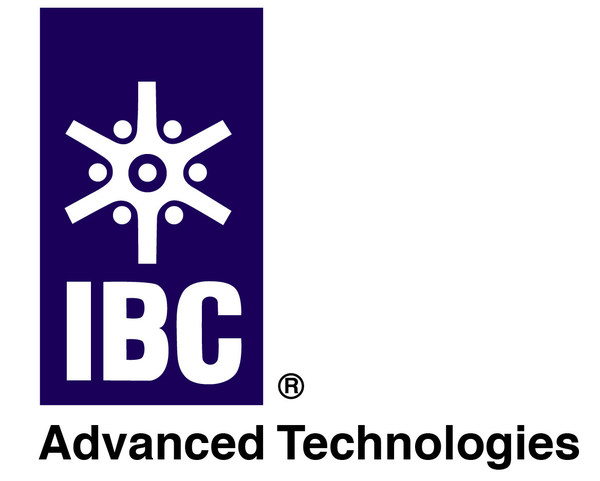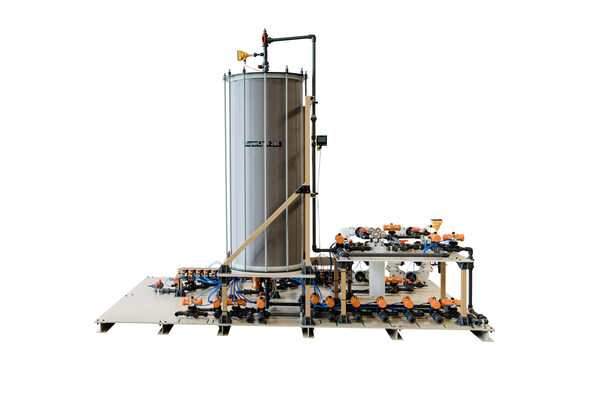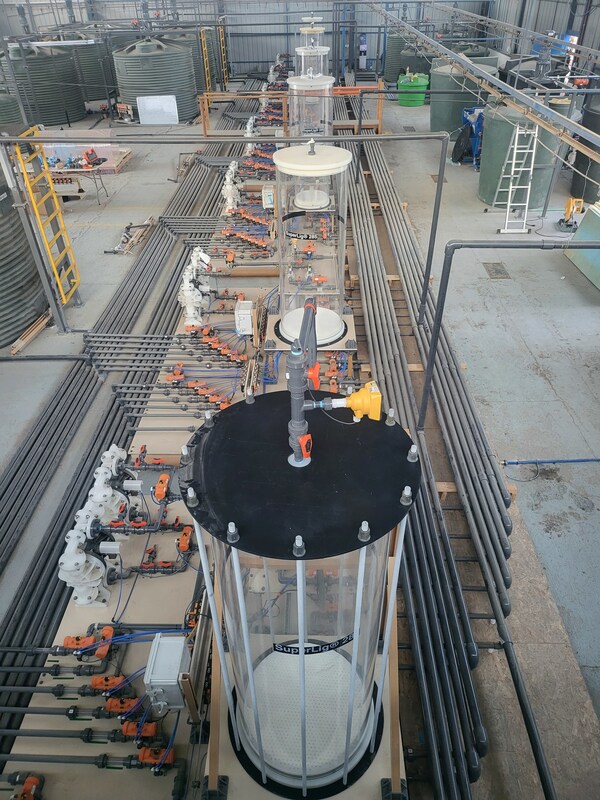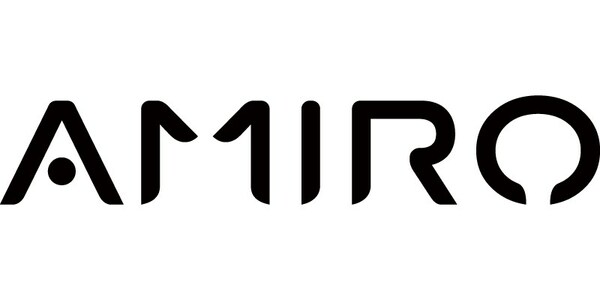 |
AMERICAN FORK, Utah, March 24, 2023 /PRNewswire/ — IBC Advanced Technologies, Inc. (“IBC”) announces Phase One results of the Direct Lithium to Product™ (DLP™) pilot plant (“Pilot Plant”) currently operating at Salar de Maricunga, Chile. The Pilot Plant has undergone validation testing and begun Phase One operation (“Phase 1.”) Phase 1 results demonstrate highly selective, high-yield direct lithium (“Li”) extraction from brine and high water efficiency.
Summary
- Highly selective, high yield (99+%) direct lithium extraction from Salar de Maricunga brine
- High water efficiency
- Production of a concentrated, pure lithium eluate solution (9 g/L Li)
- Specifications met for subsequent direct production of battery-grade lithium hydroxide monohydrate, without the need to first produce lithium carbonate
DLP™ Process
DLP™ is a self-contained process that produces battery-grade lithium end-products at the same site as lithium extraction.
The first step in the DLP™ process is highly selective direct lithium extraction from brine using a fully-automated Molecular Recognition Technology™ (MRT™) system built by IBC. Brine is flowed through the MRT™ system containing SuperLig® 285 resin beads (manufactured by IBC) packed into a column. SuperLig® 285 is highly selective for Li over other brine constituents including magnesium, calcium, sodium, potassium and boron. No pre-extraction steps are required. As brine passes through the MRT™ column, Li is selectively extracted and rapidly loaded onto the SuperLig® 285 resin at high capacity. Very rapid and efficient elution, or stripping, of the lithium from the loaded SuperLig® 285 resin results in a concentrated, pure lithium eluate solution. A small amount of water is used to wash the SuperLig® 285 column. The treated (Li-depleted) brine (with the small amount of water used to wash the MRT™ column) can be reinjected into the salar. Water used in the remainder of the DLP™ process is completely recycled.
The DLP™ process is highly water-efficient. Water conservation results from:
- Need for only infrequent washing of the MRT™ columns
- No introduction of contaminants in the simple column washing procedure, thereby allowing the small volume of wash water to go with the Li-depleted brine back into the salar
- Production of a concentrated, pure lithium eluate solution, thereby minimizing downstream processing volume
- Complete recycling of process water
Lithium hydroxide monohydrate is produced directly, without the need to first produce lithium carbonate. The DLP™ process avoids the conversion of lithium carbonate to lithium hydroxide, which requires an inefficient, complex, lengthy, costly, energy-intensive and environmentally damaging process wherein up to 20% of the lithium is lost. Depending on the market price, this large operational inefficiency cost can amount to tens of thousands of dollars per ton of lithium carbonate equivalent produced.
The DLP™ process uses no organic solvents or harsh chemicals. The primary consumable of the DLP™ process, electricity, can be provided by renewable sources on site. As all processing to final end-product is done on site, there is no need to transport process solution to an off-site processing facility.
The advanced performance of the DLP™ process results in rapid, environmentally-friendly, and highly water-efficient production of battery-grade lithium end-products:
- Throughput time from direct lithium extraction from brine to final product is minimized due to few process steps and on-site processing
- In-process Li inventory (working capital) is small due to rapid throughput
- Water is conserved
- Equipment and energy requirements are substantially decreased
- Manufacturing footprint is optimized
The simplified design of the DLP™ processing flowsheet results from:
- Highly selective, high yield (99+%) direct lithium extraction from brine
- High Li elution (or recovery) efficiency from the MRT™ column, resulting in a concentrated, pure lithium eluate solution, which minimizes downstream processing volume
- Direct production of battery-grade lithium hydroxide monohydrate, without the need to first produce lithium carbonate
DLP™ Pilot Plant Phase 1 Results
- 99+% of lithium selectively extracted directly from Salar de Maricunga brine; lithium is below analytical detection limits in Li-depleted brine.
- Exceptionally high selectivity for lithium over other ions present in the brine (including sodium, potassium, magnesium, calcium, and boron), meeting specifications for subsequent direct production of battery-grade lithium hydroxide monohydrate, without the need to first produce lithium carbonate. No pre-removal or concentration steps are required.
- Production of concentrated, pure lithium eluate solution (9g/L Li), meeting the Phase 1 design specification, with optimization to 10 g/L Li slated for upcoming phases, without extracting or evaporating water from the salar.
- Demonstration of high water efficiency – lithium-depleted brine (with the small amount of water used to wash the MRT™ column) is suitable for reinjection into the salar, thereby conserving water, minimizing negative environmental impacts, and accelerating production.
- Operation at ambient temperature and atmospheric pressure with a minimal carbon footprint.
Concentrations of key elements in the Salar de Maricunga brine are: Li (0.767 g/L), Mg (5.37 g/L) and Ca (7.2 g/L). The Phase 1 average flowrate of brine through the MRT™ system is 7.2 m3 per day. Subsequent phases are now being implemented to achieve a full Pilot Plant capacity average flowrate of 50.4 m3 per day.
The Pilot Plant is being operated with the support of SIMCO Lithium, a JV between Grupo Errazuriz (55%) and Simbalik Group (45%), in cooperation with the Japanese company Chori.
José Joaquín Matte, Manager of New Businesses of the Errázuriz Group stated: “The installation and start-up of the DLP™ Pilot Plant, incorporating MRT™, is the first step to environmentally sustainable, ESG positive production of lithium from Salar de Maricunga brine. The revolutionary DLP™ process promises to completely transform the processing of lithium and the structure of the lithium-producing industry. We are very pleased with the Phase 1 results. The DLP™ process has proven to be far superior to other processes based on solar evaporation ponds or direct lithium extraction (DLE) that are inefficient, consume large amounts of water and require extensive, costly, environmentally damaging and energy intensive processing to produce battery-grade end-products.”
Steven R. Izatt, President and CEO of IBC commented: “IBC’s DLP™ process has been demonstrated for the sustainable, circular economy, highly selective, high-yield direct lithium extraction from brine, meeting specifications for subsequent direct production of battery-grade lithium hydroxide monohydrate, without the need to first produce lithium carbonate. We look forward to fully implementing the environmentally-friendly, highly water-efficient DLP™ process at Salar de Maricunga.”
Background of IBC
IBC is an award-winning manufacturer and supplier of highly selective separations products, engineered systems and processes based on Molecular Recognition Technology™ (MRT™), including the transformative Direct Lithium to Product™ (DLP™) process for highly selective direct lithium extraction from brine and direct production of battery-grade lithium end-products. Based on green chemistry and green engineering principles, IBC’s SuperLig®, AnaLig® and MacroLig® products and associated processes are used worldwide in mining, metals, manufacturing, environmental, medical, analytical and laboratory applications.
Related Links
www.ibcmrt.com













